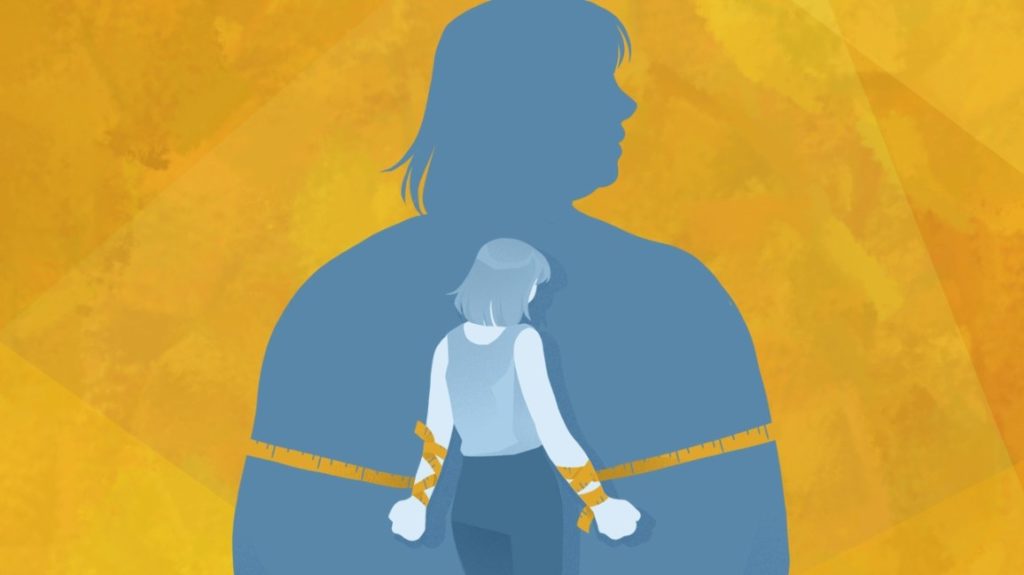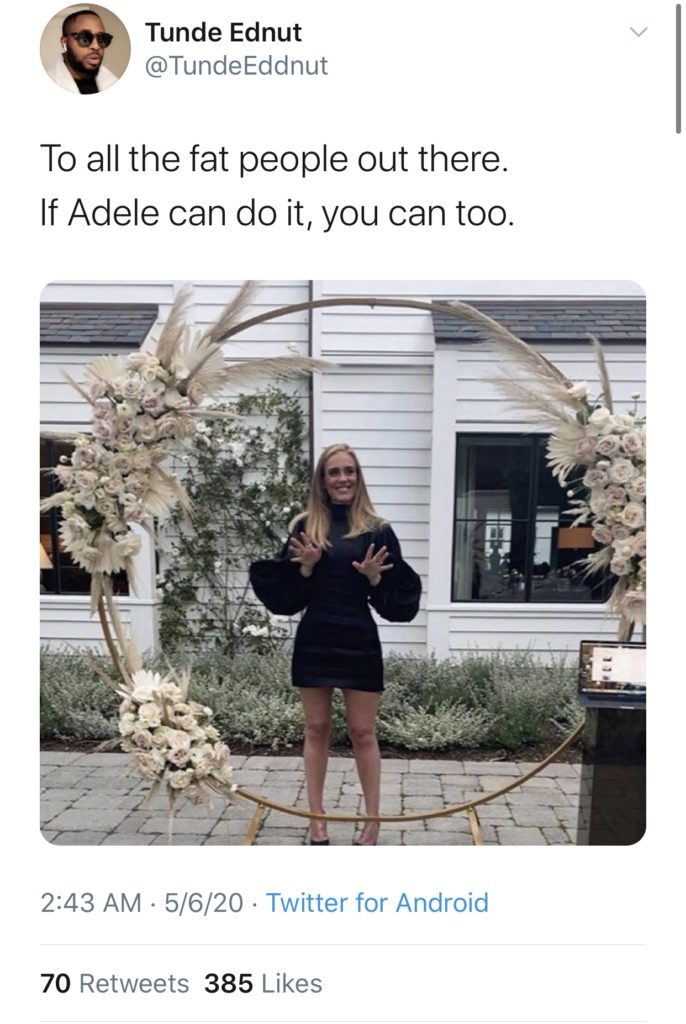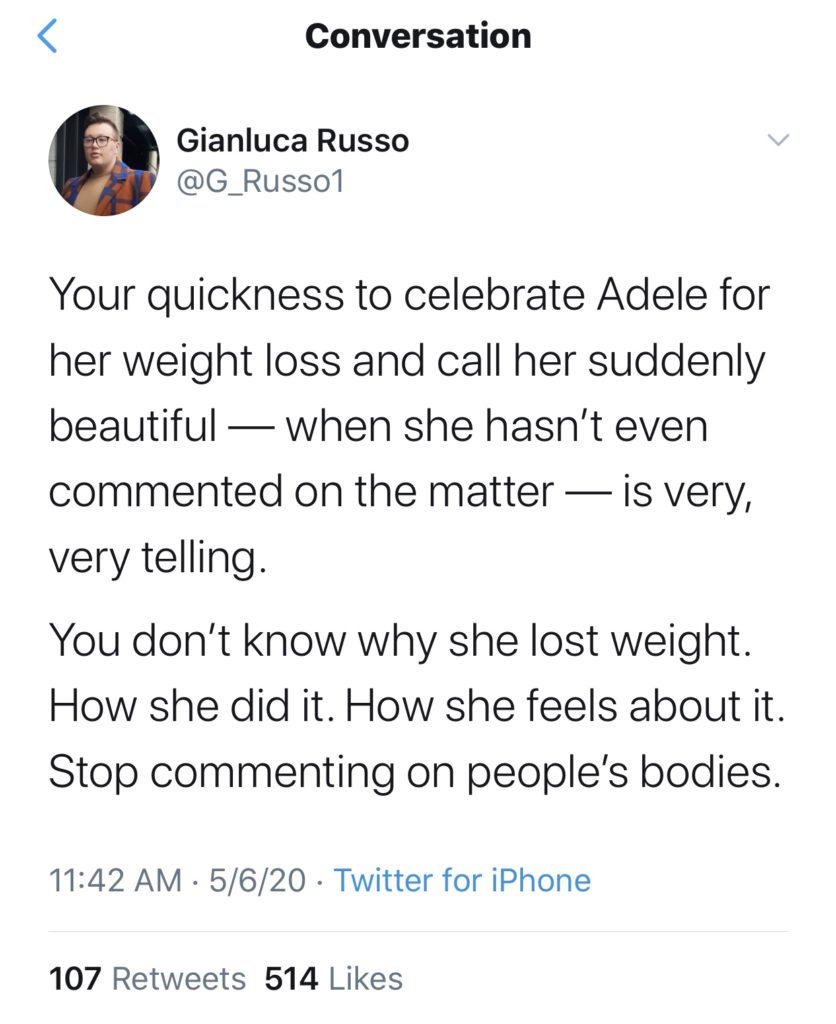In this op-ed, Florida A&M University senior, Aiyana Ishmael, explains the complex connection of weight loss to beauty and how it can affect other plus-size women and their journey.
Twitter once again was in disarray as singer-songwriter, Adele, posted a photo to her social media. The post showcased the 32-year-old in a simple black dress, while the caption discusses her appreciation for all the birthday wishes she received. She also thanked the essential employees that are still working during the pandemic.
But, the one thing everyone took from the image was the fact that she lost weight. Twitter rushed to share the new photo of Adele attaching words like “glow up,” “new body,” and using comparison photos of the English singer when she was at a heavier weight.
Nowhere in the Instagram post did Adele mention her weight loss. But that is the main takeaway everyone got out of it.
“Are people just silently waiting for me to lose weight?”
Weight is such a complex thing. As a plus-size woman I’ve always struggled with the fine line of attaching my beauty to my weight.
This conversation brought on by Adele’s new photo brought back the unparalleled experiences I’ve had all my life. The question in my head that always seems to linger: “Are people just silently waiting for me to lose weight?”
Ever since high school friends and strangers alike would see me after I’d lost a few pounds and say: “Wow! You look amazing!” or “You lost weight? You look so great!”
This would happen so often I wondered if when my friends saw me gain weight did they think: “Wow, she looks bad.”
Society as a whole projects their fat-phobia unto others constantly. We noticed quickly while on stay-at-home orders, comments were made about not wanting to “get fat” or gain that “quarantine 15.” These sentiments are so harmful for women like me— women battling weight loss while trying to love their plus-size body.
I soon realized that I was a part of the problem.
I can’t act like these ideals haven’t conditioned me to react the same. My first thoughts seeing those photos of Adele were that she did in fact look great and how different she looked skinnier. I soon realized that I was a part of the problem.
Although not said out loud I constantly dream about the moment when I’ll finally be thin. I’ve prepared Instagram captions in my head referencing my future “glo-up.”
So much of my life I’ve spent planning and preparing for how my life will be when I finally lose all the weight I want to. But that isn’t fair to myself and any other plus-size woman.
Our bodies shouldn’t dictate when we will be deemed worthy, determine our “glo-up”, and they shouldn’t be directly correlated to our beauty.
Adele is a 15 time Grammy award-winner, and yet this photo was what made her “glo-up.” While Twitter users are simply making jokes, they will always be taken the wrong way. Using the award-winning artist’s photo at a heavier weight, saying that she went from begging for someone to pick up the phone to now “new phone who this?” implies that plus-size women aren’t worthy of affection and most importantly common decency.
Your jokes aren’t just jokes, they’re telling signs of fat-phobia whether you realize it or not. You might think your comments are helpful, giving the “necessary push” to your other friends, but what you’re telling them is that they aren’t good enough. That their weight determines their worth.
Someone’s body isn’t yours to mandate, nor is it yours to judge.
The main argument Twitter users are saying is that they’re happy for her weight loss, but that’s what people don’t understand: someone’s weight loss isn’t yours to be happy for. Inserting yourself into their journey isn’t helpful— if anything it is harmful.
I’ve noticed repeatedly when I thought I was ready to open up to friends about my weight journey that they still held societal standards of how I should look.
This isn’t to say that Adele couldn’t be completely open and indifferent to these remarks. Her journey could be something she wants the world to discuss and cheer her on for, but that isn’t a universal feeling.
Someone’s body isn’t yours to mandate, nor is it yours to judge.
Topics like these always become personal to anyone who struggles with body image. So, when people complain about the “body positivity” people jumping into the argument it seems almost laughable to me. Discussions like these are our issue because they directly affect us.
When I lose all the weight I plan to, I don’t want people to discredit who I was 50 or 80 pounds ago, because that girl was still beautiful, successful and most importantly human.

















